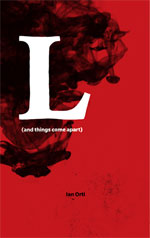
L (and things come apart), by Ian Orti, is a haunting novella about a disintegrating marriage, a disintegrating mind, or maybe both. L (and things come apart) is an extended prose poem about a new relationship springing from the ashes of a lacerated and incinerated relationship. L (and things come apart) is all this and more.
Cafe owner Henry seems to acquiesce to being cuckolded and humiliated by his nameless wife, a museum director, who invites her lovers to interminable dinner parties in the home she shares with Henry. Henry seeks solace in longer hours at his cafe, where he enjoys the company of his quirky customers and rents an upstairs apartment to an attractive, enigmatic woman named L. L is quietly mercurial and troubled, and possibly being pursued. Henry is attracted to her and wants to help her, but perhaps cannot, as his world seems to be figuratively and literally crumbling. Orti has constructed a dark, enticingly murky tale that might or might not be a romance. The book is deceptively rich and complex in form and imagery despite its comparative brevity. Matryoshka dolls of story fragments and images are repeated and reopened within other stories and images. New life and stories rise out of the ashes of previous lives and stories. Old rooms and houses renovate themselves magically overnight. Plants rapidly overgrow a burned-out cafe (is this real or imagined?), possibly out of season when the seasons seem to be out of sync to begin with … and on and on. As Henry struggles to keep his modest business operating, and his modest and increasingly fragile psyche functioning, the city around him is tumbling into disarray. Is there a transit strike going on, or has the climate come irreparably unhinged and the citizenry is banding together and protesting? And what about the mammoths?Enormous impossibilities marching towards them one large impossible step at a time: elaborately decorated, fully tusked, long-haired mammoths. How many he couldn’t tell, but they were in rows of two, surrounded on either side by the people of the city. Their bodies swayed with each imposing step. Henry searched people’s faces for some explanation or at least a sign of terror, but he found neither.”
Is Henry indeed coming apart – but gently so, hence the absence of terror over the improbable things happening around him – and in the process, are his images and memories of the key people in his life also shattering and fragmenting? In the end, perhaps his cruel, unfaithful wife is not what she seems. Are she and L and a mysterious other woman at the dinner parties all facets of the same person? Orti leaves enough shimmering clues and suggestions that each reader can draw his or her own conclusions.
As it culminates, L (and things come apart) reveals its circular structure, similar to the likes of Under the Volcano, with which it shares a hypnotic quality. This is a book that will be something new and fresh with each re-reading, which it deliciously invites. Thank you to Invisible Publishing for providing a review copy of L (and things come apart), by Ian Orti.